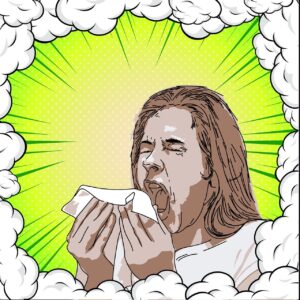HENDERSON COUNTY – April 26, 2024 – The Department of Public Health confirmed 27 cases of whooping cough in Henderson County on April 25th and increased to 51 cases one week later. The first case was reported on April 3rd. Most of the cases are in school-aged children. This is the largest outbreak for whooping cough in 7 years when there was a total of 95 cases.
Whooping cough (pertussis) is a highly contagious respiratory disease that can cause serious problems, especially in babies. It is caused by the Bordetella pertussis bacteria. The infection affects the airways and the lungs. The bacteria can spread by being close to an infected person who sneezes or coughs. Whooping cough peaks in summer and fall.
After exposure to the pertussis bacteria, it may take 5 to 10 days to begin showing common cold-like symptoms, with a runny nose, low-grade fever, and mild cough (except in babies). 1-2 weeks after the symptoms begin, infected persons may develop violent coughing fits that usually last 1-6 weeks. The illness is commonly called whooping cough because of the high-pitched “whoop” sound at the end of the coughing fit, when a person is finally able to inhale. Once the coughing fit lessens, recovery may take 2-3 weeks.
The highest at-risk group are unvaccinated babies under a year old. Almost one-half of this group is hospitalized. Babies and young children may have difficulty breathing and can turn blue from lack of oxygen. Complications include pneumonia, breathing difficulties, brain infection, and convulsions.
Other high-risk groups include: adults with pulmonary problems like asthma and chronic obstructive pulmonary disease, pregnant women, and people with weakened immune systems. The intense coughing spells can result in loss of bladder control, vomiting, headaches, light-headedness, weight loss, and rib fractures from intense coughing.
Once the diagnosis is made or exposure is confirmed, antibiotics should be started immediately. Starting antibiotics after 3 weeks of symptoms will not be effective, because the bacteria have already left the body.
The best way to protect against whooping cough is to get vaccinated. The CDC recommends vaccination for all at-risk groups. The whooping cough vaccine is combined with diphtheria and tetanus vaccines. Booster shots are encouraged for teens and adults every 8-10 years to boost immunity. People can still get sick if they are vaccinated, but not as severely ill as unvaccinated individuals.
The Henderson County Public Health Department is trying to contain the outbreak with extensive contact tracing and by providing guidance to schools and the community. The outbreak appears to be confined to Henderson County. As of April 29th, there has been only 1 confirmed case in Buncombe County, according to Health Director Ellis Matheson. Transylvania County has 2 confirmed cases. A whooping cough outbreak is defined as 3 related cases that are not in the same household.
Listen to the full report below:
Contact: Dr. Dick Needleman, Health reporter, 103.3 AshevilleFM, [email protected]
More Posts for Show: Asheville FM News Hour
